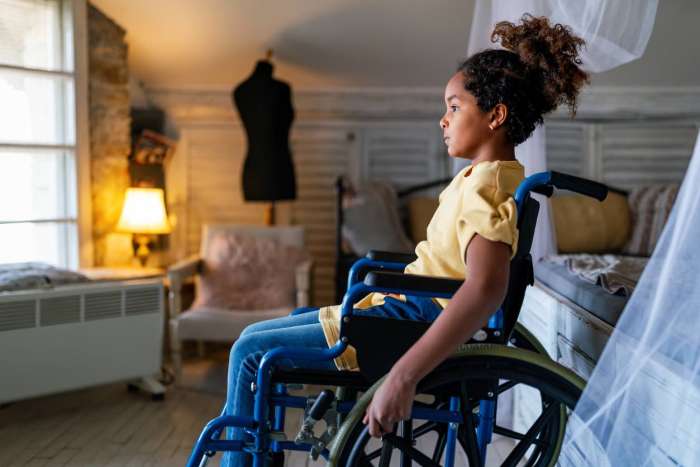We always hope our children feel confident, loved, and safe, right?
However, the world can be a scary place – and you never know who you can trust with your kids. Particularly for neurodiverse kids, autistic children and teens, and other children and adults with disabilities, the odds of being sexually abused are a real risk.
Many parents will (and honestly should) discuss with their children the sexual abuse signs, how to say “no”, and what to do if they feel uncomfortable around someone.
This isn’t a topic to avoid if your child has special needs – those with a disability are unfortunately easy targets for sexual abuse.
Related: #MeToo: How to Talk to Your Child About Sexual Harassment
Concerned About Sexual Abuse in Autistic Kids and Teens
“I know from personal and professional experience that having a loved one with a disability is stressful on many levels, and worrying about the “what-ifs” can make managing each day that much more difficult,” says Matthew Hoffman LMFT, a Madison, Connecticut-based family therapist.
“As they become older and more independent, risks abound, especially because they come in contact with more and more people. Being taken advantage of and even being abused is a real threat that is constantly on the mind of caregivers.”
What to Do When Your Kid Gets in Trouble at School
Even the most well-behaved kids sometimes get in trouble at school. Whether your kid is five or 15, what do you do when you learn that your child did something wrong in school? How do you, as a parent, handle the situation and discuss it with a defiant child? Or a quiet, shy child? Read More

The Scary Stats: People with Disabilities Are at Risk of Sexual Abuse or Assault
There are specific reasons why people with autism or other developmental disabilities may be groomed for sexual abuse.
“People with disabilities are less able to stand up for themselves, fight back, or notify authorities,” says North Carolina-based licensed therapist Hailey Shafir, LCMHCS, LPCS, LCAS, CCS. “Unfortunately, this makes them more of a target in the eyes of an offender, who will often strategically target vulnerable populations.”
In fact, says Shafir, according to most statistics, “Disabled people are about two and a half times more likely to be victims of violent crime than people without disabilities. People with IDD are especially likely to be victims of sexual abuse.”
Adds Shafir, “It's estimated that over 90% of people with an intellectual disability will be the victim of sexual abuse or assault, and about half will experience sexual abuse 10 times or more in their lives.”
This is heartbreaking. But you can help.
Autistic Kids and Teens Process and Understand Situations Differently

According to New Jersey-based therapist Lena Suarez-Angelino, MSW, LCSW, education, and supervision go hand-in-hand in preventing abuse.
“Education, in a way that the person with a disability can understand, is going to be key. Not all disabilities are the same and so it is important to provide resources and education in a way that they can understand best.” Remember – “It’s common for the perpetrator to try to clarify any attempts at the victim’s outreach for help as some sort of miscommunication or misunderstanding.”
Adds Hoffman, “Most people with disabilities struggle to process at least some types of information in real time – with social information in particular. Think about how much social information we need to process quickly in order to respond in real time. Now imagine that the processing is delayed, even by a few seconds.”
Watch for Signs of Sexual Abuse or Molestation in Children
“Having a dedicated, watchful, and attentive team of caregivers is the best prevention against abuse of a person with disabilities,” says Shafir. “Disability rights activists, caregivers, and other professionals providing services to people with disabilities need to be informed and educated about the widespread problem of abuse among people with disabilities.”
When there are signs that indicate a person with disabilities is being abused, “calling the authorities is the right thing to do,” says Shafir. “If the person is a minor, child protective services is who you call to make a report of child abuse. The more information you can provide to support your concerns, the better the chances are that a case will be opened.”
It’s important the abuse victim feels like they have the support of adults they can trust and someone who can help them process and work through their experience.
“Help the person with a disability to cope with the physical, mental, and emotional trauma that is experienced being a victim of abuse,” says Suarez-Angelino. “Aside from seeking professional support, the most important thing you can do is to advocate and believe the person with a disability they are being abused. A disabled person needs your support to amplify their voice and end the abuse.”
Disabilities and Abuse Resources and References:
If you’re looking for resources that can help fight abuse of people with disabilities, we recommend families research these references and organizations:
- End Abuse of People with Disabilities (endabusepwd.org),
- Sexual Violence.pdf (thearc.org)
- Disability without Abuse (disability-abuse.com)
- NCEDSV-Dev Disabilities-Parent Resources
###
Expert Sources:
Therapist Matthew Hoffman, LMFT
(860) 235-4056
Therapist Lena Suarez-Angelino, MSW, LCSW
Publicist Tara Tisch-Wallace
Community Manager, ChoosingTherapy.com
Therapist Hailey Shafir, LCMHCS, LPCS, LCAS, CCS
Publicist Tara Tisch-Wallace
Community Manager, ChoosingTherapy.com



